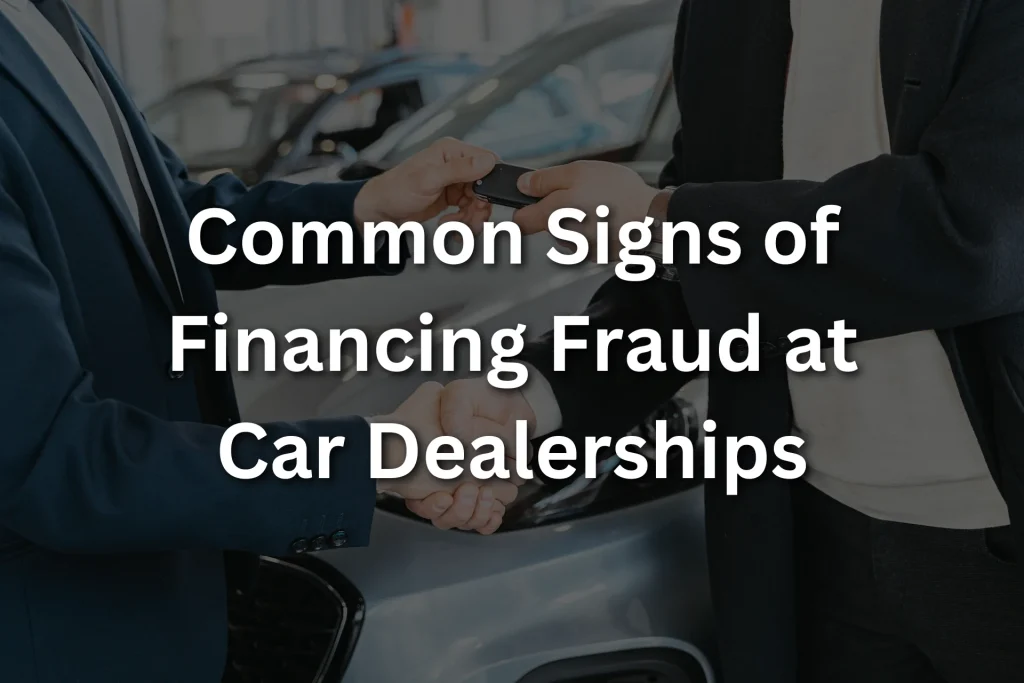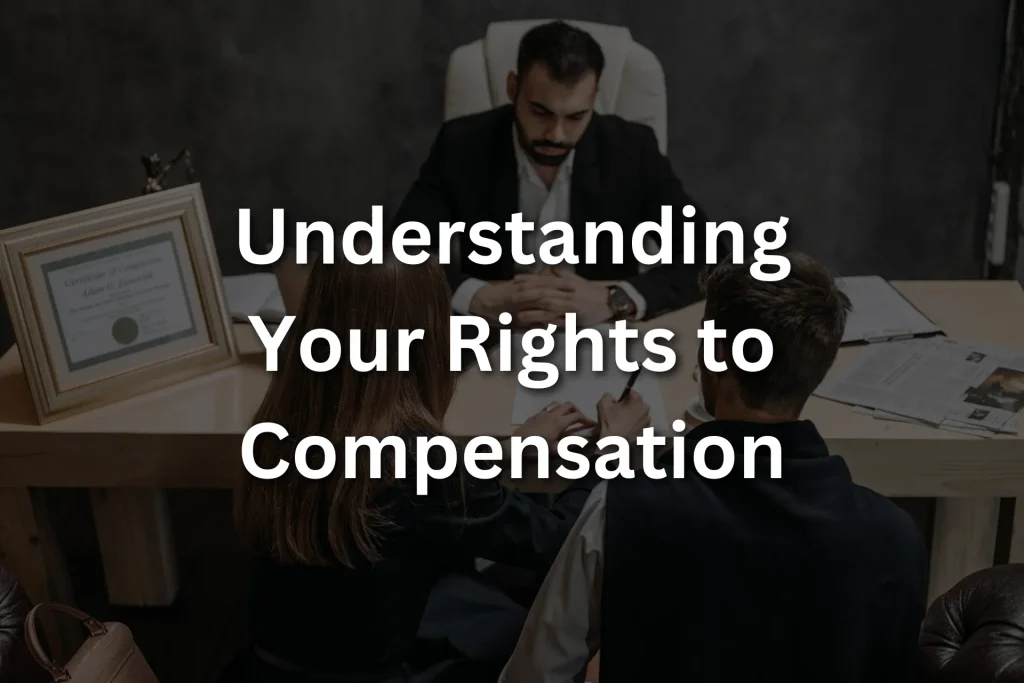
Discovering that a car dealer lied about financing can be both frustrating and financially devastating. At Consumer Action Law Group, we regularly help consumers who have fallen victim to fraudulent practices by car dealerships. We see many car buyers find themselves trapped in unfavorable loans after dealers misrepresent financing terms or manipulate loan applications. From our experience, understanding what rights you have and what available legal remedies you have is crucial when dealing with dishonest dealers who engage in deceptive financing practices.
Common Signs of Financing Fraud at Car Dealerships

Car dealership fraud in financing transactions often follows a predictable pattern. Initially, a dealer might promise favorable loan terms to get you to purchase the car. They may quote an attractive monthly payment or low interest rate when in reality, these terms aren’t actually available. Then days or weeks after you’ve taken your new car home, the dealership contacts you saying that the original financing fell through. This deceptive practice is known as yo-yo financing. It occurs when a car dealer deliberately allows you to drive away before finalizing the loan approval process.
These dishonest dealers frequently target consumers who may have limited financing options or poor credit scores. They exploit this vulnerability by manipulating loan applications, often by inflating income figures or misrepresenting employment history to financial institutions. This increases the likelihood of getting your loans approved, forcing you to pay a lot more than you can afford. Some dealers even submit multiple loan applications to different lenders without the buyer’s knowledge, causing unnecessary hard inquiries on their credit reports.
Legal Protections Against Dealer Fraud
Many consumer protection laws exist to protect car buyers from fraudulent financing practices. If a car dealer lied about financing terms, these laws provide various remedies for the car buyer. While the state’s attorney general’s office handles some consumer fraud claims, working with experienced consumer fraud attorneys is usually the quicker and more effective way to get compensation.
Many states have specific statutes addressing auto fraud and deceptive lending practices. These laws often allow victims to recover compensatory damages, punitive damages, and attorney fees. Additionally, federal regulations like the Truth in Lending Act provide important protections regarding the disclosure of financing terms. Understanding these legal frameworks will help you recognize the different types of auto fraud when it happens to you.
The Impact of Dealership Fraud on Your Financial Health
If a car dealership lied about your loan terms, the financial consequences often extend far beyond the issue of higher monthly payments. Many victims of dealer fraud face financial problems that can take years to resolve. And when the dealership submits these loan applications without your knowledge, it can hurt your credit score because the submissions can count as hard inquiries. These inquiries can stay on your credit report for up to two years, meaning that your ability to obtain other financing, such as for homes, employment, and education, will be negatively impacted.
Paying excessive car payments can hurt your financial life in the long run. Some consumers become attached to their vehicles, which may affect their decision when financing the car, even if the terms are not favorable. In severe cases, consumers can have their car repossessed if they cannot afford to continue making their car payments, leading to further credit damage and other potential legal complications.
Understanding Yo-Yo Financing Schemes in Detail
Yo-yo financing is one of the most extreme forms of dealer deception in the auto dealer industry. This scheme begins when a dealer allows you to take possession of a new car with apparently approved financing terms. The contract often seems favorable in the beginning, with reasonable monthly payments and interest rates. However, the dealer knows that the financing isn’t final and plans to call you back claiming the original loan fell through.
These calls typically come days or weeks after you’ve already taken the vehicle home, made insurance arrangements, and possibly sold or traded in your previous car. The dealer then presents you with a new contract featuring significantly higher interest rates or monthly payments, claiming it’s the only way to keep the vehicle. Many car buyers feel like they have no other choice and accept these predatory terms so they’re able to commute to work or drop off their kids at school. This practice particularly affects consumers with limited credit options, who may feel they have no choice but to accept the new terms.
Identifying Red Flags During the Car Buying Process
Being able to recognize financing fraud can help you avoid being ripped off and from stress. Watch for dealers who seem overly eager to discuss monthly payments while avoiding questions about the total loan amount or interest rate. Be particularly cautious if a car dealer pressures you to sign incomplete loan applications or attempts to rush you through document review. Some dealers may claim that certain blank spaces on contracts are “standard” or will be “filled in later” – these are serious warning signs of potential fraud.
Pay special attention when a dealership makes promises that seem too good to be true, particularly regarding financing approval regardless of your income level or credit history. Legitimate dealers typically require thorough documentation and verification of financial information. If a car dealership appears willing to bypass standard verification processes or suggests manipulating application information to secure approval, these are clear signs of potentially fraudulent practices.
Taking Action Against Deceptive Dealers

When you discover a dealer lied about your loan terms, taking action immediately improves your chances of successful legal recourse. You can start by gathering all documentation related to your vehicle purchase, including the original advertisements, emails, text messages, and any promises made by the dealership. Keep detailed records of all communications with the car dealer after the sale, particularly regarding changes to your financing terms. These records form the foundation of potential fraud claims against the dealership.
Document any financial harm you’ve experienced, including additional costs, higher monthly payments, or income lost due to the dealer’s deceptive practices. If you’ve incurred expenses trying to resolve the situation, such as obtaining credit reports or seeking legal consultation, keep receipts and records of these costs as well. This documentation strengthens your position when pursuing compensation through legal channels.
Working with Consumer Fraud Attorneys
Successfully challenging fraudulent car financing usually requires experienced legal representation. Consumer fraud attorneys specializing in auto fraud have the law at their disposal to go after the wrongdoers for fraud. They can evaluate your situation, identify laws that the dealer violated, and develop effective strategies for pursuing legal action against dishonest dealers.
Another reason to hire an auto fraud attorney is that they know the steps to take to win your case against the dealer. Almost always, the first action is sending the dealer a demand letter. The demand letter states what the dealer did wrong and what you demand from the dealer to remedy the issue. If the letter only comes from the consumer, they may just ignore it and hope that the consumer gives up. However, if they know that the letter is coming from an attorney, they will take it more seriously because they know that if the case ends up in court, they will lose more money.
Understanding Your Rights to Compensation
Victims of car dealership fraud may be entitled to various forms of compensation. Aside from monetary damage from the finance scam, you might recover damages for:
- Excess interest paid on fraudulent loans
- Fees and charges resulting from dealer misrepresentation
- Damage to your credit report and credit score
- Attorney fees and legal costs
In cases of particularly extreme fraud, courts may award punitive damages to punish dealerships and deter similar conduct. Your attorney can explain which types of compensation apply to your specific situation and help pursue appropriate remedies.
Contact Consumer Action Law Group Today
If the car dealer lied to you about financing, get legal help today. Contact the Consumer Action Law Group today for a free initial consultation. During the consultation, you will have a chance to tell us your situation. Our legal team will then analyze your case, explain your rights, and let you know your options regarding your situation.
We understand the stress and financial strain caused when a car dealer lies about financing, and we’re committed to helping you seek justice and compensation. Take the first step toward resolving your situation by contacting our office today. With our experience in auto fraud cases, we can help you fight back against dishonest dealers and work to secure the compensation you deserve.












